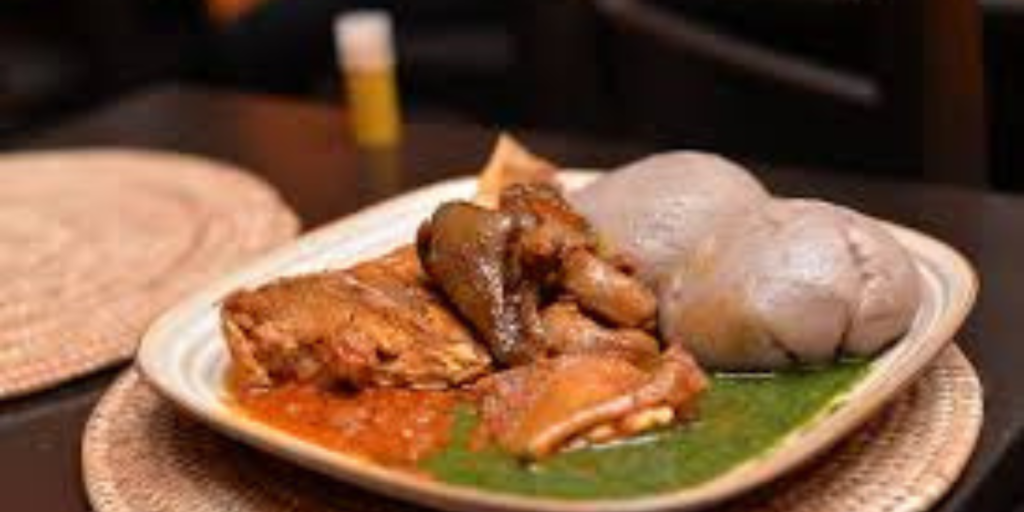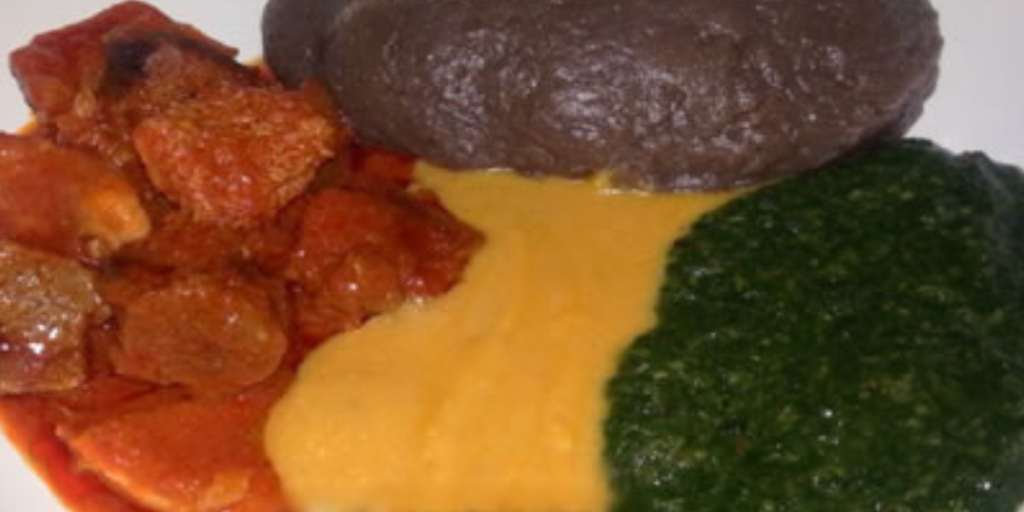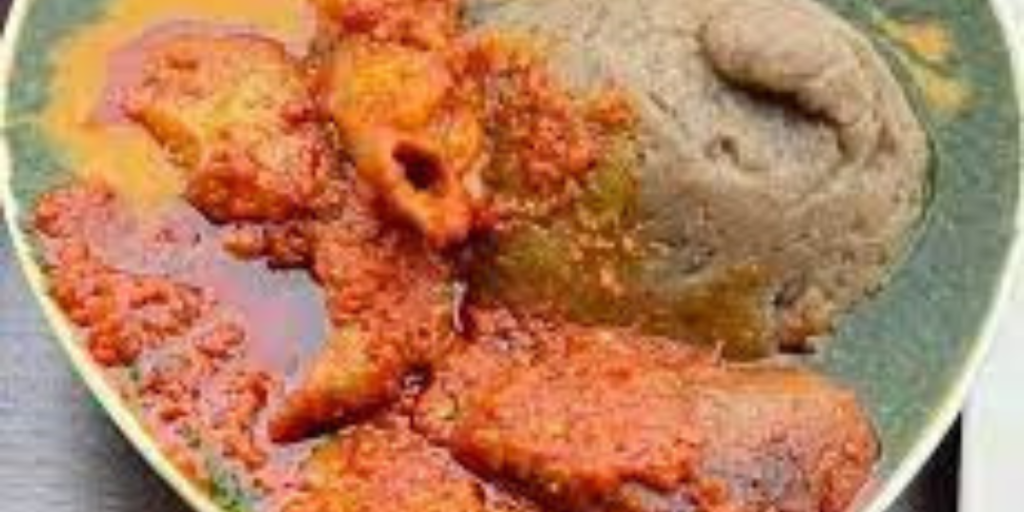Table of Contents

Amala and Ewedu are traditional Nigerian dishes that have been cherished for generations. These dishes are not just staples of Nigerian cuisine but also hold significant health benefits that make them a nutritious addition to any diet. In this comprehensive article, we will explore the origins of Amala and Ewedu, their nutritional profiles, and the myriad of health benefits they offer. Additionally, we will address frequently asked questions about these dishes and encourage readers to share their experiences and recipes.
Nigerian cuisine is rich and diverse, reflecting the country’s various cultures and traditions. Amala and Ewedu, in particular, are deeply rooted in the Yoruba culture and are celebrated for their unique flavors and health benefits. Amala is a smooth, dough-like food made from yam, cassava, or plantain flour, while Ewedu is a leafy green soup made from Jute leaves. When combined, they create a delicious and nutritious meal that supports overall health and well-being.
Does Amala and Ewedu Help with Weight Loss? Best 1
What is Amala?

History and Origin
Amala is a beloved traditional dish in Nigeria, particularly popular among the Yoruba people. It is made from yam flour (Elubo), cassava flour, or unripe plantain flour. The process of making Amala involves drying and grinding these ingredients into a fine powder, which is then cooked with water to create a smooth, dough-like consistency. This dish has been a staple in Nigerian households for centuries, valued for its simplicity, versatility, and nutritional benefits.
The history of Amala dates back to ancient times when the Yoruba people discovered that drying yams and grinding them into flour was an effective way to preserve this important crop. This method allowed them to store yam flour for extended periods, ensuring a steady food supply even during off-seasons. Over time, the preparation of Amala evolved, and it became a central part of Yoruba cuisine, enjoyed by people of all ages.
Types of Amala
There are several types of Amala, each with its unique preparation method and nutritional profile:
- Yam Amala (Amala Isu): Made from yam flour, this type is rich in carbohydrates and provides a quick source of energy. Yam Amala is the most common type and is known for its smooth texture and slightly brown color.
- Cassava Amala (Amala Lafun): Made from cassava flour, it is known for its high fiber content and digestive benefits. Cassava Amala has a lighter color and a slightly different texture compared to yam Amala. It is especially popular in regions where cassava is a major crop.
- Plantain Amala (Amala Ogede): Made from unripe plantain flour, it is rich in vitamins and minerals, particularly potassium and vitamin C. Plantain Amala has a unique flavor and is often favored by those looking for a nutritious alternative to yam or cassava Amala.
The versatility of Amala allows it to be paired with various soups and stews, making it a favorite in Nigerian households. Whether served with Ewedu, Egusi soup, or Okra soup, Amala provides a satisfying and nourishing meal.
What is Ewedu?

History and Origin
Ewedu, also known as Jute leaves, is a leafy green vegetable commonly used in Nigerian cuisine. It is particularly popular among the Yoruba people and is known for its mucilaginous (slimy) texture, which is similar to okra. Ewedu is traditionally cooked and blended into a smooth, green soup that is often served with Amala. The use of Ewedu in Nigerian cuisine dates back centuries and is deeply rooted in cultural practices and traditional medicine.
Ewedu has been cultivated in Nigeria for generations, and its use extends beyond culinary purposes. The Yoruba people have long recognized the medicinal properties of Ewedu, using it to treat various ailments and promote overall health. The leaves are believed to have anti-inflammatory, antioxidant, and immune-boosting properties, making them a valuable addition to the diet.
Amala and Ewedu Recipe: 1 Of The Best Yoruba Heritage
Preparation Methods
Preparing Ewedu is relatively simple and involves the following steps:
- Plucking and Washing: The leaves are plucked from the stems and thoroughly washed to remove any dirt or impurities. Fresh Ewedu leaves are preferred for their vibrant color and nutritional value.
- Cooking: The leaves are then cooked in water until they become tender. This process usually takes about 5-10 minutes, depending on the freshness of the leaves.
- Blending: Once cooked, the leaves are blended or pounded to achieve a smooth consistency. A traditional broom-like whisk called “Ijabe” is often used for this purpose, although modern blenders can also be used.
- Seasoning: The blended Ewedu is seasoned with traditional spices such as locust beans (iru), salt, and sometimes ground crayfish. These seasonings enhance the flavor of the Ewedu and complement its natural taste.
Ewedu is often served with a side of Amala, creating a perfect balance of flavors and textures. The slimy texture of Ewedu complements the smoothness of Amala, making it a popular combination in Nigerian cuisine.
Nutritional Profile of Amala
Key Nutrients
Amala is a powerhouse of essential nutrients, making it a healthy addition to any diet. The nutritional content can vary depending on the type of flour used. Here are the key nutrients found in Yam Amala, which is the most common type:
- Carbohydrates: Yam Amala is rich in complex carbohydrates, providing a steady release of energy. These carbohydrates are essential for fueling the body and supporting physical and mental activities.
- Dietary Fiber: It contains a good amount of dietary fiber, which aids in digestion and helps maintain bowel health. Fiber also promotes satiety, helping to control hunger and manage weight.
- Vitamins: Amala is a good source of B vitamins, including B6 and B9 (folate), which are essential for energy metabolism and brain health. These vitamins play a crucial role in converting food into energy and supporting cognitive function.
- Minerals: It provides essential minerals such as potassium, magnesium, and iron, which support various bodily functions. Potassium helps to regulate blood pressure, magnesium supports muscle and nerve function, and iron is vital for oxygen transport in the blood.
The combination of these nutrients makes Amala a balanced and nutritious food that can support overall health and well-being.
Caloric Content
The caloric content of Amala can vary depending on the type and quantity consumed. On average, a serving of Yam Amala (about 100 grams) contains approximately 150-200 calories. This makes it a relatively low-calorie food that can be enjoyed as part of a balanced diet.
For those looking to manage their weight, Amala can be a satisfying and nutritious option. Its high fiber content helps to keep you feeling full for longer, reducing the likelihood of overeating and aiding in weight control. Additionally, the slow-digesting carbohydrates help to stabilize blood sugar levels, preventing spikes and crashes that can lead to cravings.
Chin Chin | What is the Role of Egg in Chinchin?2024…
Nutritional Profile of Ewedu

Key Nutrients
Ewedu is not just flavorful but also packed with essential nutrients that contribute to overall health. Here are the key nutrients found in Ewedu:
- Vitamins: Ewedu is an excellent source of vitamins A, C, and E, which are important for immune function, skin health, and antioxidant protection. Vitamin A supports vision and immune health, vitamin C boosts collagen production and immunity, and vitamin E protects cells from oxidative damage.
- Minerals: It is rich in minerals such as calcium, potassium, and magnesium, which are crucial for bone health, muscle function, and cardiovascular health. Calcium supports strong bones and teeth, potassium helps regulate blood pressure, and magnesium is essential for muscle and nerve function.
- Fiber: Ewedu contains a significant amount of dietary fiber, which aids in digestion and promotes a healthy gut. Fiber helps to regulate bowel movements, prevent constipation, and support a healthy gut microbiome.
- Protein: It provides a moderate amount of plant-based protein, which is essential for tissue repair and growth. Protein is also important for maintaining muscle mass and supporting overall health.
The rich nutrient profile of Ewedu makes it a valuable addition to any diet, supporting various aspects of health and well-being.
Caloric Content
Ewedu is a low-calorie vegetable, with approximately 30-40 calories per 100 grams. This makes it an ideal addition to meals for those looking to maintain or lose weight while ensuring they receive vital nutrients.
The low-calorie content of Ewedu, combined with its high nutrient density, makes it a perfect choice for a healthy diet. It can be enjoyed as a soup, added to smoothies, or incorporated into various dishes to boost their nutritional value.
Health Benefits of Amala
Digestive Health
The high fiber content in Amala, particularly when made from cassava or plantain flour, promotes healthy digestion. Dietary fiber helps to regulate bowel movements, prevent constipation, and maintain a healthy gut microbiome. This can reduce the risk of developing digestive disorders such as irritable bowel syndrome (IBS) and diverticulitis.
Fiber also acts as a prebiotic, providing food for beneficial gut bacteria. A healthy gut microbiome is essential for overall health, supporting immune function, nutrient absorption, and mental well-being. By including Amala in your diet, you can promote a healthy digestive system and improve your overall health.
Best Cameroonian Croquettes Recipe of 2024
Energy Boosting
Amala is a rich source of complex carbohydrates, which are broken down slowly by the body to provide a steady and sustained release of energy. This makes it an excellent choice for individuals who require long-lasting energy throughout the day, such as athletes and those with physically demanding jobs.
The slow-digesting carbohydrates in Amala help to maintain stable blood sugar levels, preventing energy crashes and promoting consistent energy levels. This can enhance physical performance, improve concentration, and support overall well-being.
Weight Management
Amala’s low-calorie and high-fiber profile make it a great food for weight management. The fiber helps to keep you feeling full for longer, reducing the likelihood of overeating and aiding in weight control. Additionally, the slow-digesting carbohydrates help to stabilize blood sugar levels, preventing spikes and crashes that can lead to cravings.
Including Amala in your diet can support weight loss and maintenance efforts, providing a nutritious and satisfying option that helps to control hunger and promote satiety.
Health Benefits of Ewedu

Rich in Antioxidants
Ewedu is packed with antioxidants, including vitamins A, C, and E, which help to protect the body from oxidative stress and free radical damage. Antioxidants are essential for reducing the risk of chronic diseases such as heart disease, cancer, and diabetes.
The antioxidants in Ewedu help to neutralize free radicals, unstable molecules that can cause cellular damage and contribute to the development of chronic diseases. By including Ewedu in your diet, you can support your body’s natural defense system and promote overall health.
Supports Heart Health
The combination of potassium, magnesium, and dietary fiber in Ewedu contributes to heart health. Potassium helps to regulate blood pressure by counteracting the effects of sodium, while magnesium supports normal heart rhythm and muscle function. The fiber content helps to lower cholesterol levels, reducing the risk of cardiovascular disease.
Ewedu’s nutrient profile supports various aspects of heart health, helping to maintain healthy blood pressure, reduce cholesterol levels, and promote overall cardiovascular well-being.
Enhances Skin Health
Ewedu is known for its skin-enhancing properties, largely due to its high vitamin content. Vitamin A promotes healthy skin cell production, while vitamin C aids in collagen synthesis, keeping the skin firm and youthful. Vitamin E provides antioxidant protection, preventing damage from UV rays and environmental pollutants.
Including Ewedu in your diet can support healthy, radiant skin, providing essential nutrients that promote skin health and protect against environmental damage.
Combining Amala and Ewedu for Maximum Benefits
Synergistic Nutrients
When Amala and Ewedu are combined in a meal, they create a nutritionally balanced dish that provides a wide range of essential nutrients. The carbohydrates from Amala provide energy, while the vitamins, minerals, and antioxidants from Ewedu support overall health. This combination ensures that you receive a well-rounded intake of nutrients in one meal.
The synergy between Amala and Ewedu enhances their nutritional benefits, making them a powerful combination for promoting health and well-being.
Traditional Pairing Benefits
The traditional pairing of Amala and Ewedu is not just based on taste but also on nutritional synergy. The fiber in Amala complements the vitamins and antioxidants in Ewedu, enhancing digestion and nutrient absorption. This combination also provides a satisfying and filling meal that supports weight management and overall health.
The traditional pairing of Amala and Ewedu is a testament to the wisdom of Nigerian culinary traditions, offering a delicious and nutritious meal that supports overall health.
Cultural Significance and Culinary Uses
Role in Nigerian Culture
Amala and Ewedu hold a special place in Nigerian culture and cuisine. They are often served at special occasions such as weddings, festivals, and family gatherings. The preparation and consumption of these dishes are steeped in tradition, with recipes passed down through generations.
Amala and Ewedu are more than just food; they are a symbol of cultural heritage and community. Sharing a meal of Amala and Ewedu is an expression of hospitality and togetherness, bringing people together to celebrate and enjoy the rich flavors of Nigerian cuisine.
What makes chin chin soft and crunchy? Best Of 2024
Modern Adaptations and Recipes
While traditional recipes remain popular, there are also modern adaptations of Amala and Ewedu that cater to contemporary tastes and dietary preferences. For instance, Amala can be made with whole wheat flour for a different flavor and texture, and Ewedu can be blended with other leafy greens for added nutritional benefits. Sharing these modern recipes can inspire readers to try new variations and keep the tradition alive.
Modern adaptations of Amala and Ewedu showcase the versatility and creativity of Nigerian cuisine, offering new ways to enjoy these traditional dishes while preserving their nutritional benefits.
Frequently Asked Questions (FAQs)
- What is the best way to cook Amala and Ewedu for maximum health benefits?
- The best way to cook Amala is to use freshly ground yam, cassava, or plantain flour and cook it with water until smooth. For Ewedu, use fresh Jute leaves, cook until tender, blend, and season with traditional spices. Using fresh ingredients and minimal processing helps to preserve the nutritional value of these dishes.
- Can Amala and Ewedu be included in a weight loss diet?
- Yes, both Amala and Ewedu can be included in a weight loss diet. Amala is low in calories and high in fiber, promoting satiety and reducing the likelihood of overeating. Ewedu is also low in calories and packed with essential nutrients, making it a healthy addition to any weight loss plan.
- Are there any side effects of eating Amala and Ewedu?
- Generally, Amala and Ewedu are safe to eat and have no significant side effects. However, individuals with allergies to any of the ingredients should avoid these dishes. It is also important to consume them in moderation as part of a balanced diet.
- How often can I eat Amala and Ewedu?
- Amala and Ewedu can be enjoyed regularly as part of a balanced diet. They provide essential nutrients and support overall health, making them a valuable addition to your meal plan.
- Can I substitute Amala with other flours?
- Yes, Amala can be made with various flours, including yam, cassava, and plantain flour. You can also experiment with other flours such as whole wheat or millet flour for a different flavor and texture.
- Is Ewedu available outside of Nigeria?
- Ewedu can be found in African and international grocery stores outside of Nigeria. Fresh or frozen Jute leaves are often available, allowing you to prepare Ewedu even if you are not in Nigeria.
- What are some popular side dishes to serve with Amala and Ewedu?
- Amala and Ewedu are often served with a variety of soups and stews, such as Egusi soup, Okra soup, and pepper soup. They can also be paired with grilled or stewed meats, fish, or beans for a complete and satisfying meal.
Encouraging Readers to Share Their Experiences
We encourage our readers to share their own experiences and recipes with Amala and Ewedu. Whether you have a family recipe passed down through generations or a modern twist on the traditional dishes, we would love to hear from you. Sharing your stories and tips can inspire others to explore these nutritious and delicious foods.
Feel free to share your experiences in the comments section or on social media using the hashtag #AmalaEweduBenefits. Your contributions can help create a community of food enthusiasts who appreciate the health benefits and cultural significance of Amala and Ewedu.
Conclusion
Amala and Ewedu are more than just traditional Nigerian dishes; they are nutritional powerhouses that offer a wide range of health benefits. From supporting digestive health to providing essential vitamins and minerals, these dishes can be a valuable addition to any diet. By exploring their rich history, cultural significance, and modern adaptations, we can appreciate the full potential of Amala and Ewedu. Try incorporating these dishes into your meals and enjoy the health benefits they bring.






















